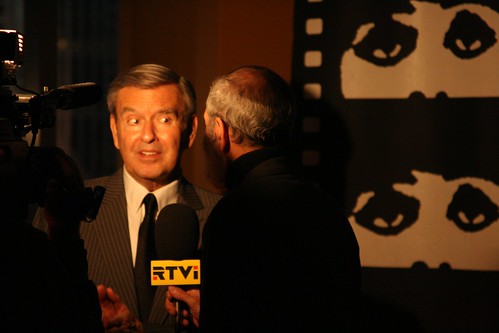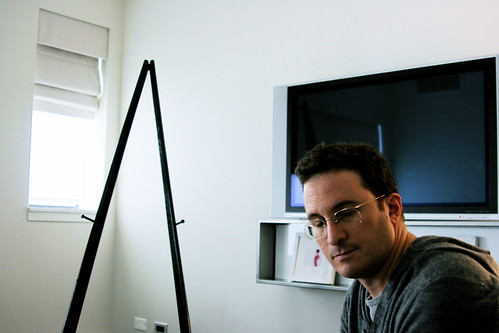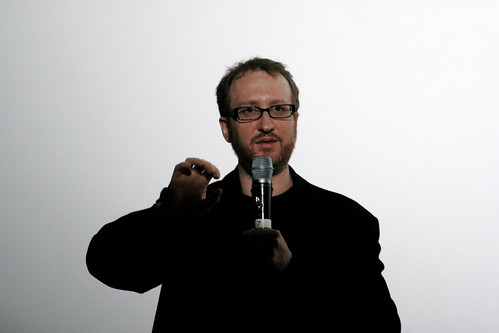Movie City Indie Archive for October, 2008
HSBC's exquisitely odd "Lumberjack" ad, shot by Alwin Kuchler
The great, versatile cinematographer Alwin Kuchler shot this exquisitely odd 90-second commercial for HSBC; scored to Joanna Newsome.
Wim Wenders shops for stinky tofu
Stinky tofu is the subject of the day in Taipei as Wim Wenders drops in to mentor and collaborate with a young Taiwanese director. “Taipei, he observed, has grown from “a sleepy city” to become “an amazing, buzzing and big city,” writes Nancy T. Lu in Taiwan News. Among her diverse observations from Wenders’ first visit in 30 years: “I may have to come back a few times more to get used to stinky tofu,” said the smiling Wenders yesterday. One of the first things Wenders did was to go to the Shihda Night Market with young Taiwan-born director Arvin Chen two nights ago [Pictured.] Wenders has accepted the invitation to be the executive producer of Chen’s “Page One Taipei.” He liked the young man’s script, he said. And so he will be his “guardian angel from Germany” in the film project to be subsidized by the Government Information Office by as much as NT$12 million and to be also supported by the Taipei City Government. “I have watched Wim Wenders’ films from childhood and I have seen how he portrays cities and people,” said Chen, who grew up in northern California. “I feel very lucky to have him as my executive producer.” Chen’s “MEI” won the Silver Bear for short film at the 2007 Berlin International Film Festival. Wenders said that a Silver Bear from the Berlin International Film Festival is something he has in common with Chen. They also share a love for movies that are portraits of cities, he said. Wenders thought that it was a good idea to have someone not exactly from here but more of a foreigner to do a film about Taipei. This person would have a different perspective, he said. Checking out the locations for the movie Chen is preparing to shoot next year as well as meeting the cast and crew have been on Wenders’ agenda during this Taipei visit. But he will not be around during the actual filming… Mayor Hau offered Wenders and Chen some pineapple cakes yesterday. He also presented the German cinema director with a nice but empty gift box to take back to Berlin. Wenders quickly scribbled “Taipei Memories” on it… Wenders used three words to sum up the movies he made in his career, indicating the films dwelled on “love, search and identity.” The award-winning Wenders gave a remark yesterday, indicating he did not follow the commercial trend to make sex scenes de rigueur in film productions. “I always thought sex didn’t belong in a movie,” said director Wim Wenders. “You never do it with the camera.” Lu differs in her closing note: “Young people, who keep sophisticated digital information systems in their bedrooms, think otherwise though.”
“I have watched Wim Wenders’ films from childhood and I have seen how he portrays cities and people,” said Chen, who grew up in northern California. “I feel very lucky to have him as my executive producer.” Chen’s “MEI” won the Silver Bear for short film at the 2007 Berlin International Film Festival. Wenders said that a Silver Bear from the Berlin International Film Festival is something he has in common with Chen. They also share a love for movies that are portraits of cities, he said. Wenders thought that it was a good idea to have someone not exactly from here but more of a foreigner to do a film about Taipei. This person would have a different perspective, he said. Checking out the locations for the movie Chen is preparing to shoot next year as well as meeting the cast and crew have been on Wenders’ agenda during this Taipei visit. But he will not be around during the actual filming… Mayor Hau offered Wenders and Chen some pineapple cakes yesterday. He also presented the German cinema director with a nice but empty gift box to take back to Berlin. Wenders quickly scribbled “Taipei Memories” on it… Wenders used three words to sum up the movies he made in his career, indicating the films dwelled on “love, search and identity.” The award-winning Wenders gave a remark yesterday, indicating he did not follow the commercial trend to make sex scenes de rigueur in film productions. “I always thought sex didn’t belong in a movie,” said director Wim Wenders. “You never do it with the camera.” Lu differs in her closing note: “Young people, who keep sophisticated digital information systems in their bedrooms, think otherwise though.”
The World's First Movie Review

[From Married to the Sea.]
And not a trace of mockery: on a new Bela Tarr project
 If I didn’t know better, I’d say this brief item in the Reporter is sarcastic. “Werc Werk Works aboard Tarr film; Company to finance, co-produce ‘The Turin Horse’
If I didn’t know better, I’d say this brief item in the Reporter is sarcastic. “Werc Werk Works aboard Tarr film; Company to finance, co-produce ‘The Turin Horse’
By Steven Zeitchik
Oct 27, 2008, 11:01 PM ET
The unusually named Werc Werk Works, an indie production company that is behind Todd Solondz’s new untitled project, has signed on for a new international co-production. Werc Werk Works will finance and co-produce The Turin Horse, a new movie from Hungarian filmmaker Bela Tarr that will use the story of a farmer and his horse as an existential metaphor. A host of European production banners will join Werc in producing the picture.” I could be wrong; maybe Mr. Zeitchik isn’t editorializing.
But also… Harmony Korine sells chocolate
Somehow the advert below reminded me of this sweet spot, directed by Harmony Korine.
George Sluizer lectures on cinema's future: The only attitude of a superior man is to persist in an activity he recognizes as useless, to observe a discipline he knows is 'sterile' and also utterly 'inconsequential.'
Dutch director George Sluizer (both versions of The Vanishing) delivered the Variety Cinema Militans Lecture in Utrecht on Sept. 27. “The lecture,” reports Variety, “is one of the highlights of the Netherlands Film Festival [and] has been delivered by some of Europe’s leading filmmakers, including Peter Greenaway, Krzysztof Zanussi and Agnieszka Holland.” All 4,200 worthy words are at the link; here’s a taste.”To put myself and you in the right spirit, let me start this Cinema Militans Lecture with a quote by the Portuguese poet Fernando Pessoa: “The only attitude of a superior man is to persist in an activity he recognizes as useless, to observe a discipline he knows is ‘sterile’ and also utterly ‘inconsequential.’ ” “Cinema” is, or I should say was, a thing of the 20th century. The film d’auteur died recently with the death of Bergman and Antonioni… In 2008, do we still need to devote our time to theories regarding film language, structure, style, editing, camera positions and all the other things we studied and were curious about 50 or 75 years ago? Today, the business of images for mass consumption is responsible for 95% of the media industry, including film for maybe 2% or 3%. Should we be nostalgic about the avant-garde filmmakers and essayists of the 20th century? No. Their way of filmmaking is now past history: very seldom today can we see films that remind us of the craft of “direct visual storytelling,” cinema that produces images that in principle need no explanation with words. Cinema is ruled by other media: television, DVDs and the Internet, and whatever is invented next. The Internet has many more consumers and much more influence than cinema ever had, and therefore it also has much more power. The new technologies determine and rule the business. They are responsible for the new way of communication between the people of the world… From an economic perspective, there is no point in investing in a delightful, memorable, challenging or subtle film, except if the product has a chance to make money. Politically speaking, art is unnecessary, because one does not need art to survive. The need for spiritual and artistic nurturing seems to have faded. It lives on mainly because some people need to fight the triumphant materialism and crave for emotions and emotivity as a proof of their existence… There are two processes that human beings cannot stop as long as they are alive: one is breathing and the other is thinking. Thinking makes us present to ourselves; thinking is the main component of our identity. Thoughts are the only assured possession we have. Thinking is supremely ours, and buried in the uttermost privacy of our being. No other human being can think my thoughts for me… There is a dichotomy, a deep fault between our old classical education and the speed of technological development. The two don’t match anymore. The abyss grows. What we have to learn is to think, something not usually taught in schools. To stay in sync with tomorrow, to learn to think, we have to learn. We have to re-adjust our mental education and mental training. Can we, for example, conceive of a society in which thinking is rationed… restricted to certain hours of the day, like food in the war was?” [Much more at the link.]
Another visit to Banksy's Village Pet Store
NOTCOT: Banksy’s Village Petstore & Charcoal Grill from Jean Aw on Vimeo.
Vain little wabbit.
Winners at the 44th Chicago International Film Festival
UNITED KINGDOM, BRAZIL, AND UNITED STATES AMONG COUNTRIES WINNING HONORS AT 44th CHICAGO INTERNATIONAL FILM FESTIVAL
CHICAGO, October 25, 2008 – Michael Kutza [pictured], Founder and Artistic Director of the Chicago International Film Festival, Mimi Plauché, Feature Film Programmer, and Jesse Berkowitz, Documentary and Shorts Programmer, proudly announce the winners of the 2008 Festival competitions.
Chicago audiences were able to choose from 116 feature films, 38 short and student films, and 18 documentaries from more than 45 countries, showcasing both established and promising new filmmakers. Competitions were held in the Feature Film, New Directors, Documentary and Short Film categories, along with a special Chicago Award for a local filmmaker. The Festival’s highest honor is The Gold Hugo, named after the mythological God of Discovery.
Feature Film Competition
* The Gold Hugo is awarded to Hunger (UK), directed by Steve McQueen, for its’ outstanding visual and dramatic strength, telling an uncompromisingly disturbing story of the courage to fight for one’s belief.
* The Grand Jury Prize is awarded to Tokyo Sonata (Japan/Netherlands/Hong Kong), directed by Kiyoshi Kurosawa, which uses a story of humble family life as a metaphor of global anxieties in an era of economic and moral collapse. The jury specially commends the fine ensemble acting.
* The Silver Hugo Award for Direction is awarded to Henrik Ruben Genz for Terribly Happy (Denmark), for great storytelling full of surprises, overturning all expectations of genre.
* The Silver Hugo Award for Best Actor is awarded to Michael Fassbender for Hunger (UK), for his self-sacrificing performance exemplifying the ideal of “being” rather than “acting.”
* The Silver Hugo Award for Best Actress is awarded to Preity Zinta for Heaven on Earth (Canada), for her strong yet subtle performance as a woman struggling to keep her dreams despite brutal realities.

* The Silver Hugo Award for Best Screenplay is awarded Maurizio Braucci, Ugo Chiti, Gianni Di Gregorio, Matteo Garrone, Massimo Gaudioso, and Roberto Saviano for Gomorrah (Italy), for their courageous adaptation of Roberto Saviano’s novel, presenting a horrifyingly realistic expose of the effect of organized crime on everyday life.
* The Silver Plaque is awarded to Nanni Moretti, Laura Paolucci and Francesco Piccolo for their sensitive adaptation of Sandro Veronesi’s Quiet Chaos (Italy/UK).
David Watkin's Holiday (1957)
Writes the BFI’s Robin Baker, “Few films have captured the kiss-me-quick pleasures of Blackpool more colourfully, energetically and convincingly than ‘Holiday’. Made by British Transport Films, it chronicles a day in the life of this most British of seaside resorts as it’s invaded by people hell-bent on getting the most fun possible from their precious holidays. It is certainly no chaste and po-faced trip. Among the candy floss and donkey rides the camera spies canoodling lovers; it lingers over near-naked flesh; captures some very suggestive shellfish-eating and offers images that must be among the most homoerotic in British cinema of the 1950s. Cinematographer David Watkin (who sadly died on 19 February 2008) achieved this level of intimacy by hiding his camera away from prying eyes under a cardboard box on the top of his van, presumably not worrying too much whether or not his subjects ever got round to signing release forms.”
Wassup! 2008
Oh my goodness. The original is below. [Via Andrew Sullivan.]
Making rock sculptures with your mind
Balancing Point from DANNY BROWN on Vimeo.
Via Laughing Squid
















